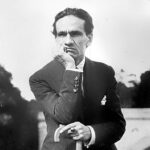Barry Lopez, whose landmark writings bore witness to the natural world, has died at 75.
Barry Lopez, whose writings offered a deep understanding and nuanced exploration of the natural world and human beings’ relationship to it, has died at the age of 75.
Over the course of half a century, Lopez’s work transformed the field of environmental writing, opening new worlds of narrative possibility; his style, which honored humans’ spiritual and intuitive connections to land while drawing on the scholarly work of scientists, historians, and philosophers, has become a guiding light for other writers now tasked with addressing a growing climate crisis.
Born in Port Chester, New York, in 1945, Lopez grew up in Southern California’s San Fernando Valley and New York City before attending the University of Notre Dame for his undergraduate and master’s degrees. He began publishing essays and other short writings in the 1960s; in 1976, he told James M. Aton for The Georgia Review, a trip to Alaska opened his eyes to the “great power of the nonhuman world (also the non-European world),” a revelation that would shape his work from that point forward. In 1978 he published Of Wolves and Men, a finalist for the National Book Award, which looked at the relationship between wolves and humans with an emphasis on indigenous viewpoints.
Arctic Dreams, his meditation on the arctic landscape published in 1986, won a National Book Award and soon became a hallmark of environmental literature. Writing with “indefatigable pleasure and authentic religiosity,” Edward Hoagland wrote for The New York Times Book Review in 1986, “the gift of sight (and second sight) focused here upon the ocean, ice, skyscapes, landscapes and wildlife is extraordinary”; Robert Macfarlane wrote that he fell in love with Lopez’s work after encountering the book for “its stylistic adventure, its ethical address and the secular spirituality of land that it advanced.”
He foregrounded perspectives that the mainstream Western approach to ecological science long neglected; namely, indigenous teachings, mythologies tied to landscape, and the significance of traditional approaches to land management. Researching these issues, he often noted, often discouraged him from emphasizing his own role as narrator in favor of foregrounding indigenous elders and others that had shared their knowledge with him. He addressed this preference, and the importance of attention and experience for its own sake, in a 2019 interview with The Believer:
I would say the first rule in connecting with nature is to pay attention, and part of paying attention is choosing to listen instead of speaking. The most difficult part of being outside one’s comfort zone is understanding how much you’re being taught by not talking. In my experience traveling with indigenous people, nobody says much of anything while they’re on the move. Because language collapses experience into meaning, and if you do it too soon, you’ve lost all the other meaning that would’ve been there.
Lopez authored a number of other books over the next several decades, including Crossing Open Ground (1988), The Rediscovery of North America (1991), About This Life: Journeys on the Threshold of Memory (1998), and Apologia (1998). But it was Horizon, published in 2019, that epitomized his extraordinary abilities as a writer and observer of the world, exploring his life through the landscapes in the Pacific Northwest, the Galapagos, the Arctic Circle, Antarctica, Australia, and eastern Africa.
He also authored a number of novels, including Desert Notes: Reflections in the Eye of a Raven (1976), Giving Birth to Thunder, Sleeping with His Daughter (1978), River Notes: The Dance of Herons (1979), Winter Count (1981), Crow and Weasel (1990), Field Notes: The Grace Note of the Canyon Wren (1994), Lessons from the Wolverine (1997), Light Action in the Caribbean (2000), Resistance (2004), and Outside (2014).
In recent years, as the climate crisis intensified and lent a new urgency to the field of environmental writing, he has critiqued the role of the nation-state and corporate interests in the destruction of the natural world. In his work, he told Edward Hellmore for The Guardian, “I’m trying to see the bigger thing that operates independently from the idea of nation state, what’s going on that’s transcultural, and who are the people worth listening to in a culture like ours where we have pretty much destroyed the elders.”
Lopez was diagnosed with metastatic prostate cancer in 2013, which, he told NPR, gave him a new understanding of empathy. “I imagined in everybody I passed there was some story that they carried with them that would break your heart,” he told Dave Blanchard.
He is survived by his wife, writer Debra Gwartney, with whom he lived for years on the upper McKenzie River on the Western Slope of the Cascade Mountains. After wildfires in the area forced them to evacuate in September, the two moved to Eugene, Oregon.





